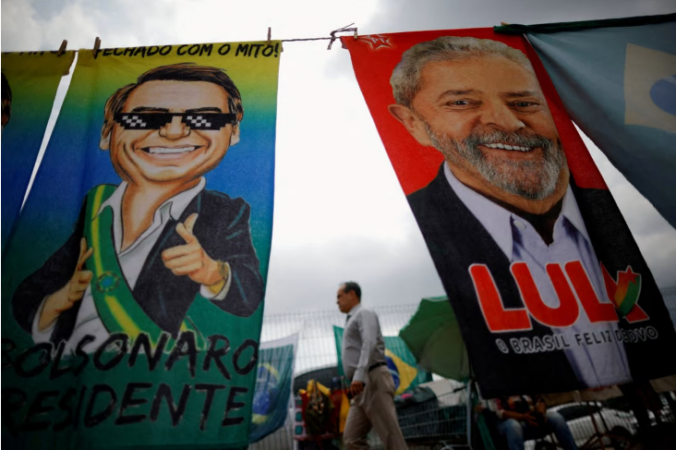
BRASILIA: Brazil's ties with China, its top trading partner, could change as a result of the ongoing conflict this month between leftist presidential candidate Luis Inácio Lula da Silva and far-right President Jair Bolsonaro.
Experts predicted that 67-year-old Bolsonaro, the "Trump of the Tropics", would at least rhetorically distance himself from China, while Lula, who served as Brazil's president from 2003 to 2010, supported close bilateral ties. , he was responsible for negotiations with Beijing.
Also Read: After a divisive Brazilian election, Bolsonaro and Lula will face off
Three days before the October 30 election, Lula, who turned 77, traveled to China in 2004 with more than 450 businessmen, laying the foundation for a successful economic alliance. Despite the effects of the COVID-19 pandemic, bilateral trade reached a record US$135 billion last year, rising for the fourth year in a row.
But under Bolsonaro's leadership, relations between China and Brazil have been strained since 2019 due to China's economic hegemony and disagreements over the causes of COVID-19.
Bolsonaro complained that China was "buying Brazil instead of buying from Brazil" during the 2018 election campaign and claimed that China was trying to de-industrialize Brazil.
In 2020, China was blamed for the pandemic and had "a name and a surname: the Chinese Communist Party", according to Eduardo Bolsonaro, a prominent politician at the time.
Jorge Heine, a research professor at Boston University's Pardi School of Global Studies and former Chilean ambassador to China, claimed that the trade and investment organization that relied on China as a market for exported goods such as soybeans and beef continued to fight against Bolsonaro. are opponents. Challenge the rhetoric. ,
"Both the military and the agribusiness community made it clear to him once he took office that he should stop the anti-China rhetoric," Hein said. In 2019, Bolsonaro complied and moved to China as needed."
According to Jeff Garmani, an associate professor of Latin American studies at the University of Melbourne, many of Bolsonaro's supporters were skeptical about China, and Bolsonaro took advantage of this on the political stage.
According to Garmani, the agribusiness lobby, which benefits China from Brazil's commodity exports, is an important part of Bolsonaro's support base.
According to Dong Jingsheng, deputy director of the Center for Latin America Studies at Peking University, the presidential election was not given priority in China.
"China and Brazil share a complementary trade relationship, especially in the areas of investment and agribusiness, and the relationship will remain strong despite changes in Brazil's political stance," Dong said.
Also Read: Brazil holds a historic election in which Jair Bolsonaro faces off against Luiz Inacio Lula da Silva
According to experts, Lula will strengthen ties between Brazil and China and become a partner in BRICS, a grouping of key emerging markets that includes Brazil, Russia, India, China and South Africa. If he wins the run-off election.
He was a founding member of the left-wing populist Workers' Party. In a controversial trial in 2017, a federal judge found him guilty of money laundering and corruption and sentenced him to 580 days in prison. However, last year, his sentence was overturned, allowing him to run for the presidency once again after Brazil's Supreme Court sided with the case's chief justice.
According to Margaret Myers, director of the Asia and Latin America program at the Inter-American Dialogue, a Washington-based think tank, Lula's victory will be a significant advantage for BRICS.
In terms of trade relations, "Lula initially envisioned BRICS as an attempt to assert the independence of a developing nation on the US dollar," she said. Since the establishment of the BRICS grouping, China has upheld this objective in countless policy documents and speeches.
After Lula was mentioned in the election forum, Brazilian economist Carin Costa Vazquez, a senior non-resident fellow at the Center for China and Globalization, a Beijing-based think tank, predicted that BRICS would once again be at the forefront of Brazil's foreign policy. . , , He said Bolsonaro's BRICS achievements have been less than expected.
The advancement of Brazil's national interests and the creation of a global regime dedicated to peace, social inclusion and environmental sustainability, he said, were two goals that the next president should clearly articulate.
According to Ralph Newmark, director of the Institute for Latin American Studies at La Trobe University in Melbourne, the candidates' impact on the bloc could be very different.
Conversely, according to Newmark, Lula's victory would help BRICS return to its original role as a counterweight to excessive US dominance and thus promote South-South development. "On the one hand, Bolsonaro's victory will strengthen the Russia-China authoritarian nationalist tone of the organization.
Lula praised China's handling of the Covid-19 outbreak and its contentious strict quarantine policy in an interview with Chinese media last year.
Social isolation, followed by vaccinations, has been shown to be the most effective method of preventing coronavirus in Europe, China, and other more responsible nations, according to Lula.
Also Read: These animals are becoming extinct rapidly in the world
He also credited China's single-party system of government and the Communist Party of China with preventing serious economic and medical crises.
He claimed that China's strong political party and strong government, which has the authority to control and command, is the reason the country was able to combat the coronavirus so quickly. "Neither does Brazil nor any other nation have that."